The Sun Rises in the East: Indian and Global Edtech Leaders Come Together in Gurgaon
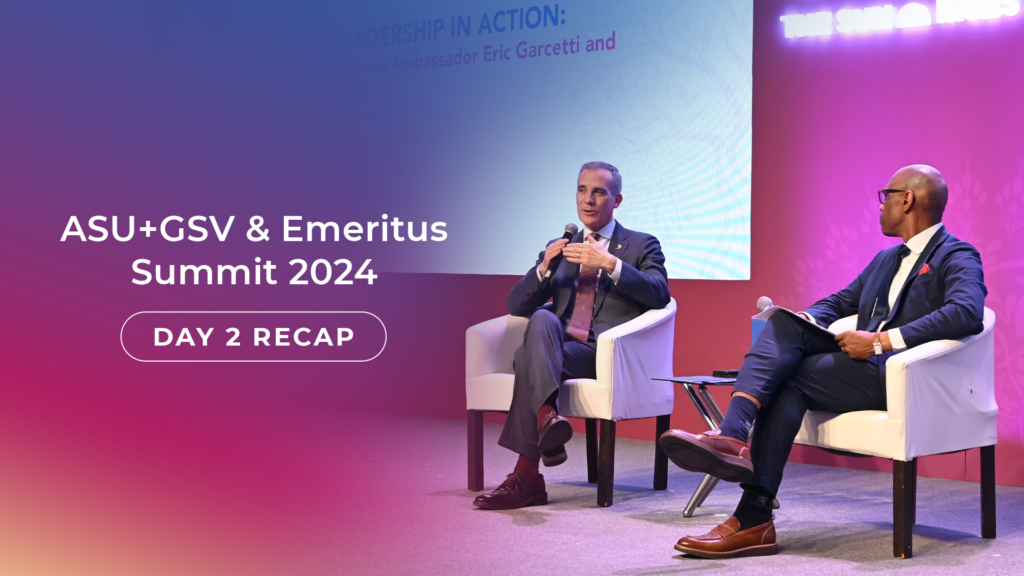
- Disruption is Key to Growth, Says India’s G20 Sherpa
- Getting the Right Mix of Global and Local While Exporting Education to the World
- AI as the Great Skill Leveler, a GSV Study
- Heading Toward a Skills-Based World With David Blake
- The Online Versus Offline Debate Among Pioneers of Edtech
- To IPO or Not to IPO, What Should Edtech Brands Do?
“AI is like air; it’s everywhere. You can’t see it, but you need it to live,” said Michael Moe in his inaugural address on ASU+GSV & Emeritus Summit 2024 Day 2. This encapsulates the mood at the summit, where delegates, speakers, and educationists alike were abuzz with AI and its endless possibilities. This year, we’re speaking of all new developments in relation to AI – coined a ‘gigatrend’. AI is a solution for scale, and what better place to do that than in India, where scaling is the main challenge for education. Clearly, it’s a match made in heaven.
The inaugural note also captured iconic entrepreneurial journeys and how Asia was uniquely positioned at the cusp of incredible growth and opportunity in 2024. Here are the key highlights from the ASU+GSV & Emeritus Summit 2024 Day 2.
Disruption is Key to Growth, Says India’s G20 Sherpa
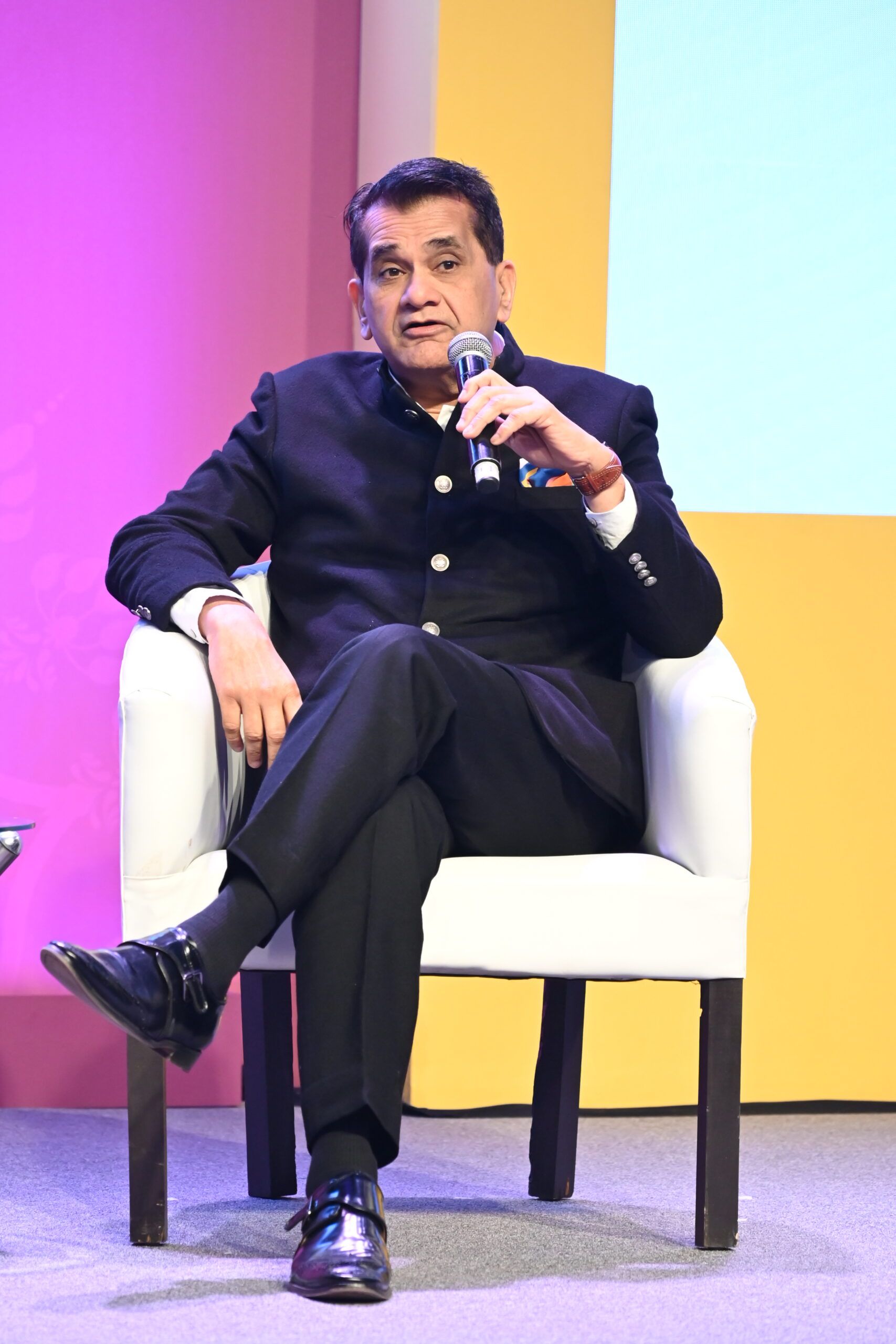 A ‘sherpa’ is traditionally the Himalayan guide who navigates the most inhospitable mountain terrains to take their leaders to the highest peaks of the Himalayas. And there is one man who has done just this for India at the G20 Summit. The G20 Sherpa, Amitabh Kant, who we had the privilege to host today, spoke at length about disruption and how that’s the only way education could trickle down to the masses of India. According to Kant, startups in India were doing just that by disrupting the ecosystem at scale while they were finding solutions for the biggest challenges, like health and nutritional standards, faced by India and, thereby, the world.
A ‘sherpa’ is traditionally the Himalayan guide who navigates the most inhospitable mountain terrains to take their leaders to the highest peaks of the Himalayas. And there is one man who has done just this for India at the G20 Summit. The G20 Sherpa, Amitabh Kant, who we had the privilege to host today, spoke at length about disruption and how that’s the only way education could trickle down to the masses of India. According to Kant, startups in India were doing just that by disrupting the ecosystem at scale while they were finding solutions for the biggest challenges, like health and nutritional standards, faced by India and, thereby, the world.
Getting the Right Mix of Global and Local While Exporting Education to the World
Indians are the biggest consumers of education. But thanks to the snowballing growth of edtech, India is also strategically placed to export education to the world. During a panel discussion at the ASU+GSV & Emeritus Summit 2024 Day 2, the Emeritus motto of ‘start global, and then go local’ was discussed by Pranjal Kumar, CFO at Emeritus. He said, “Our founders always had this vision that it is easier to move up the value chain and then move down, instead of doing it the other way around. So, if we can demonstrate that our business works in the US, then we can easily expand in India and APAC.”
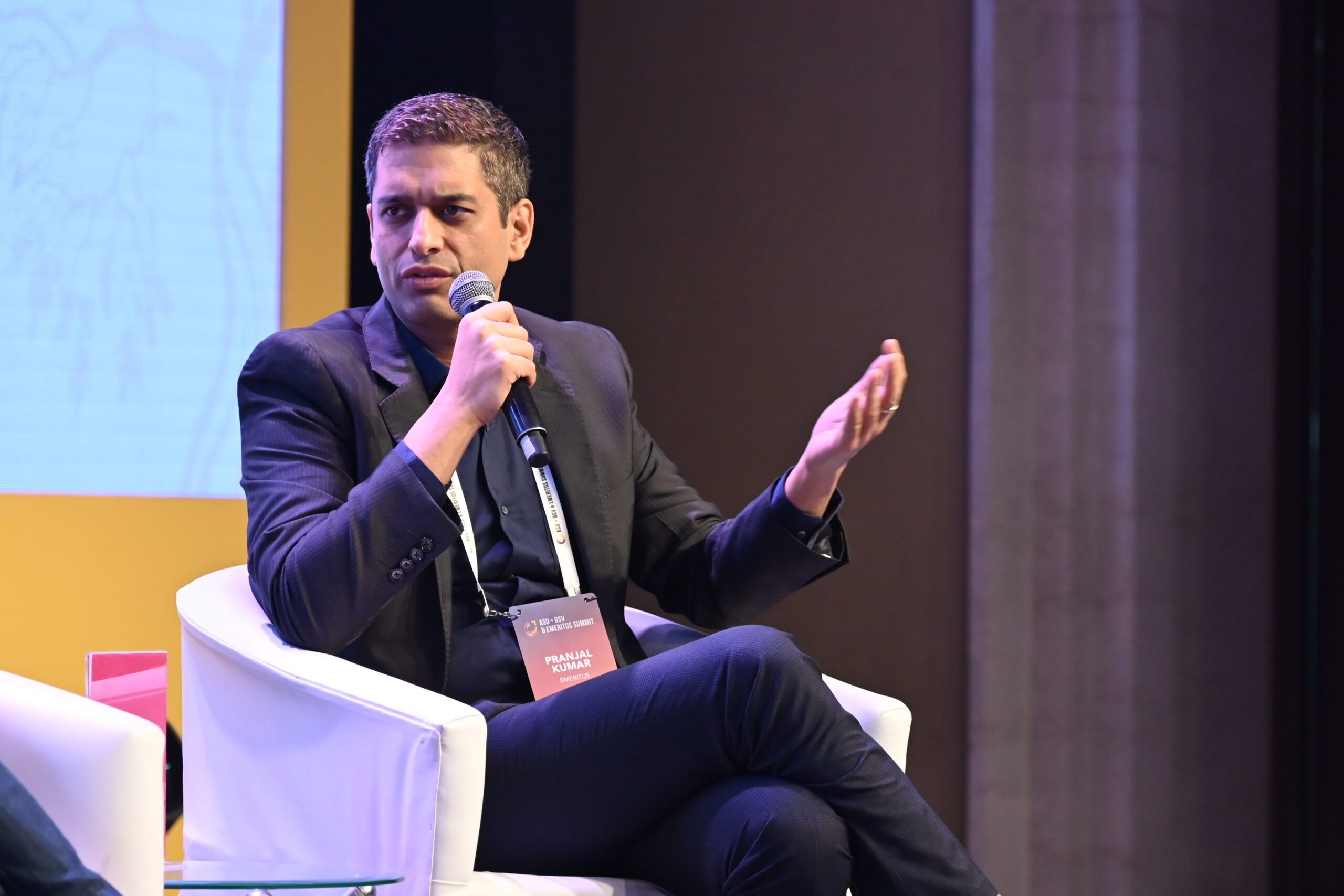 The panel discussed how education will flow from the East to the West and from the West to the East as common concerns continue to exist in the education system. Pranjal Kumar summed up the session with his take on what a good model for exporting education to a different geography is.
The panel discussed how education will flow from the East to the West and from the West to the East as common concerns continue to exist in the education system. Pranjal Kumar summed up the session with his take on what a good model for exporting education to a different geography is.
“Glocalization is the key to exporting education to any geography. It needs patience because despite the problem statement of students and teachers being global, what has worked in one geography doesn’t always work in another. That is why it is important to have local leaders to scale these businesses and also to leverage the strength of local education brands,” he said.
AI as the Great Skill Leveler, a GSV Study
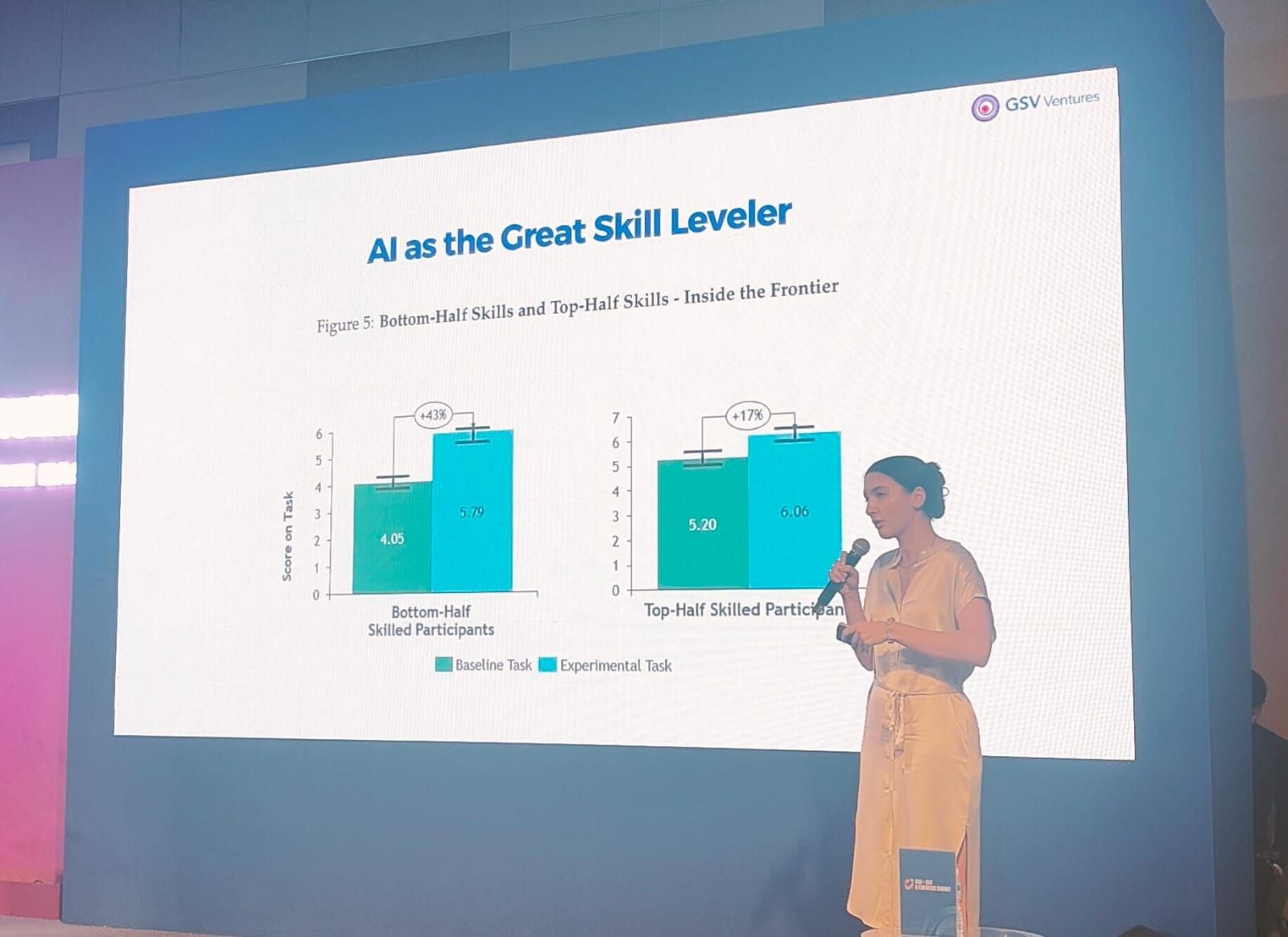 India’s generative AI landscape is booming, with over $440 million raised by Indian Gen AI startups since 2019. Projections indicate that India’s Gen AI market will exceed $17 billion by 2030. AI’s influence spans various sectors, from productivity tools to marketing to legal services, leading to the emergence of verticalized AI Copilots. Positioned as the great skill leveler, AI promises to revolutionize education and work dynamics, enabling personalized learning experiences and boosting productivity tenfold across roles with AI copilots. This enthralling session by Alexandra Argo and Claire Zau from GSV also explored innovative ways AI is reshaping teaching methodologies, personalizing learning experiences, and unlocking new frontiers in education technology.
India’s generative AI landscape is booming, with over $440 million raised by Indian Gen AI startups since 2019. Projections indicate that India’s Gen AI market will exceed $17 billion by 2030. AI’s influence spans various sectors, from productivity tools to marketing to legal services, leading to the emergence of verticalized AI Copilots. Positioned as the great skill leveler, AI promises to revolutionize education and work dynamics, enabling personalized learning experiences and boosting productivity tenfold across roles with AI copilots. This enthralling session by Alexandra Argo and Claire Zau from GSV also explored innovative ways AI is reshaping teaching methodologies, personalizing learning experiences, and unlocking new frontiers in education technology.
Additionally, 2023 is dubbed the year of AI infrastructure, with cloud platforms expected to invest heavily, potentially surpassing $100 billion. However, questions remain about AI adoption sustainability beyond the initial novelty phase, emphasizing the need for ongoing innovation and adaptation in this rapidly evolving landscape.
Heading Toward a Skills-Based World With David Blake
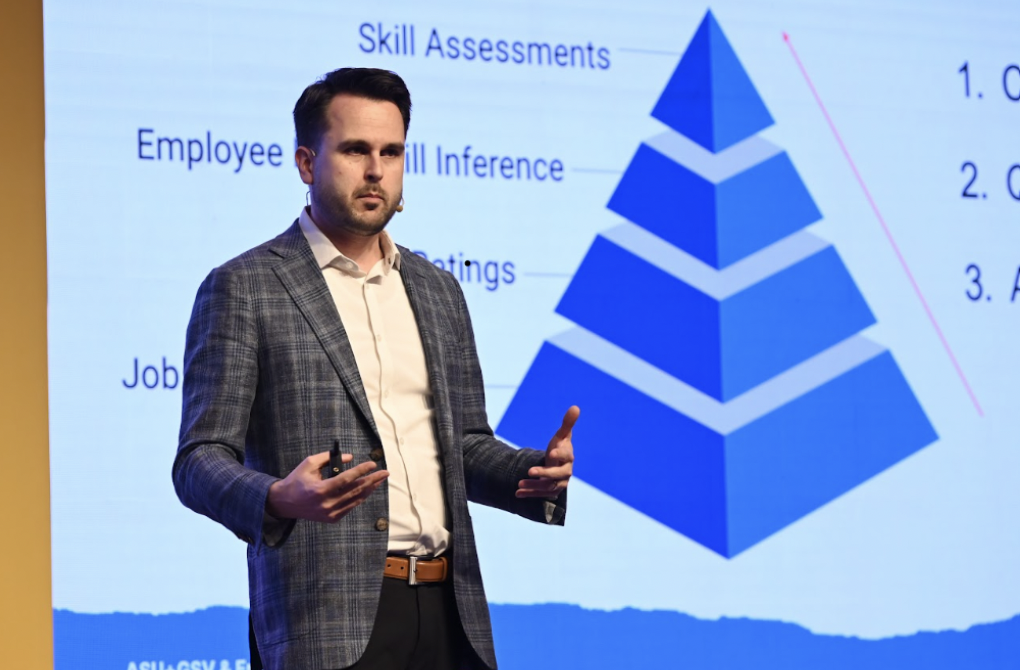 Did you know that skills-based hiring is more than 3.5% more effective than academic hiring? Or that skills-based hiring is 2X more predictive than hiring based on work experience? These numbers from a McKinsey research set the stage for the compelling narrative about a ‘Brave New World’ where skills will be the ‘new currency’ in the job market. This narrative was spun with panache by David Blake, CEO of Degreed, at the ASU+GSV & Emeritus Summit Day 2.
Did you know that skills-based hiring is more than 3.5% more effective than academic hiring? Or that skills-based hiring is 2X more predictive than hiring based on work experience? These numbers from a McKinsey research set the stage for the compelling narrative about a ‘Brave New World’ where skills will be the ‘new currency’ in the job market. This narrative was spun with panache by David Blake, CEO of Degreed, at the ASU+GSV & Emeritus Summit Day 2.
His talk highlighted a transformative shift toward organizing work based on skills rather than traditional job roles, facilitated by technology’s ability to do inventory and leverage workforce skills effectively. While underscoring the urgent need to address the widening skills gap and the increasing value placed on specific skills in the job market, he said, “We are already in a world where technology is learning faster than humans can, and this means that the skill gap will keep growing wider.”
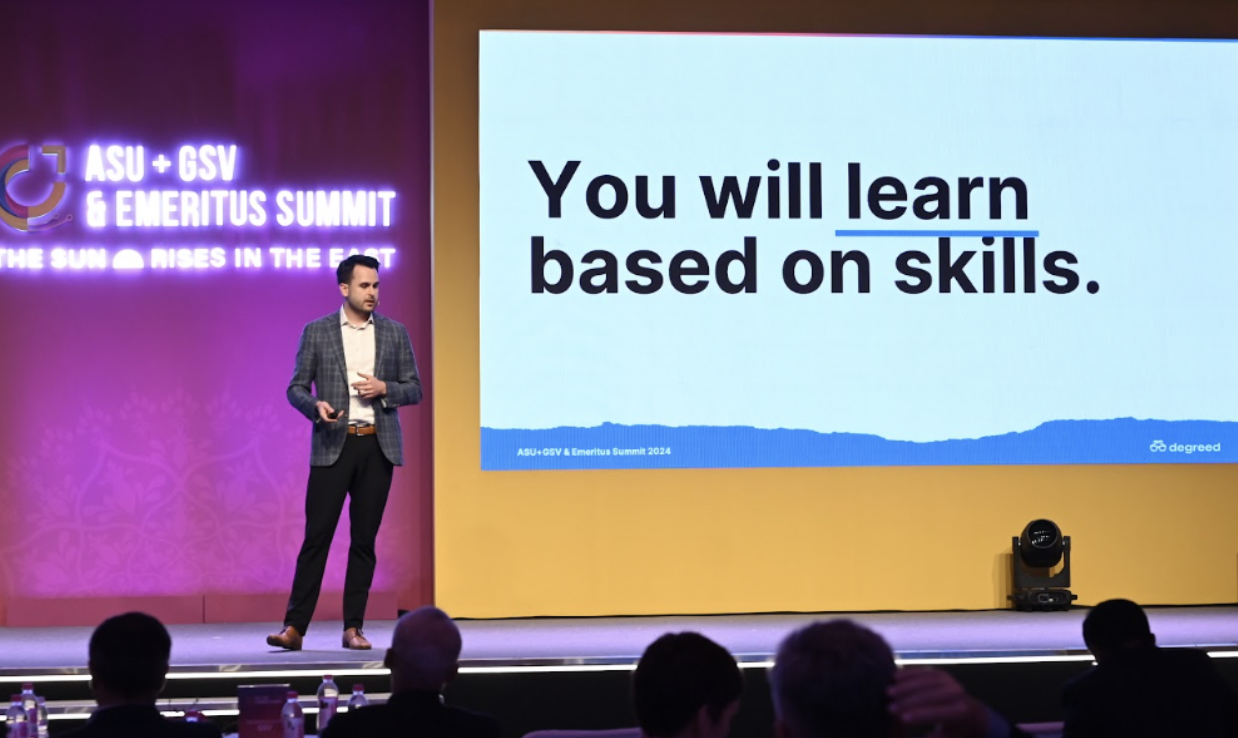 He pointed out the rapid pace at which organizations are transitioning to skills-based frameworks, predicting a significant shift towards skills-based pay and performance evaluation in the near future. Lastly, Blake also spoke about the importance of aligning India’s education system with the demands of the skills-based economy, which is inevitably coming to the forefront in the next 9-18 months to ensure its workforce remains competitive globally.
He pointed out the rapid pace at which organizations are transitioning to skills-based frameworks, predicting a significant shift towards skills-based pay and performance evaluation in the near future. Lastly, Blake also spoke about the importance of aligning India’s education system with the demands of the skills-based economy, which is inevitably coming to the forefront in the next 9-18 months to ensure its workforce remains competitive globally.
The Online Versus Offline Debate Among Pioneers of Edtech
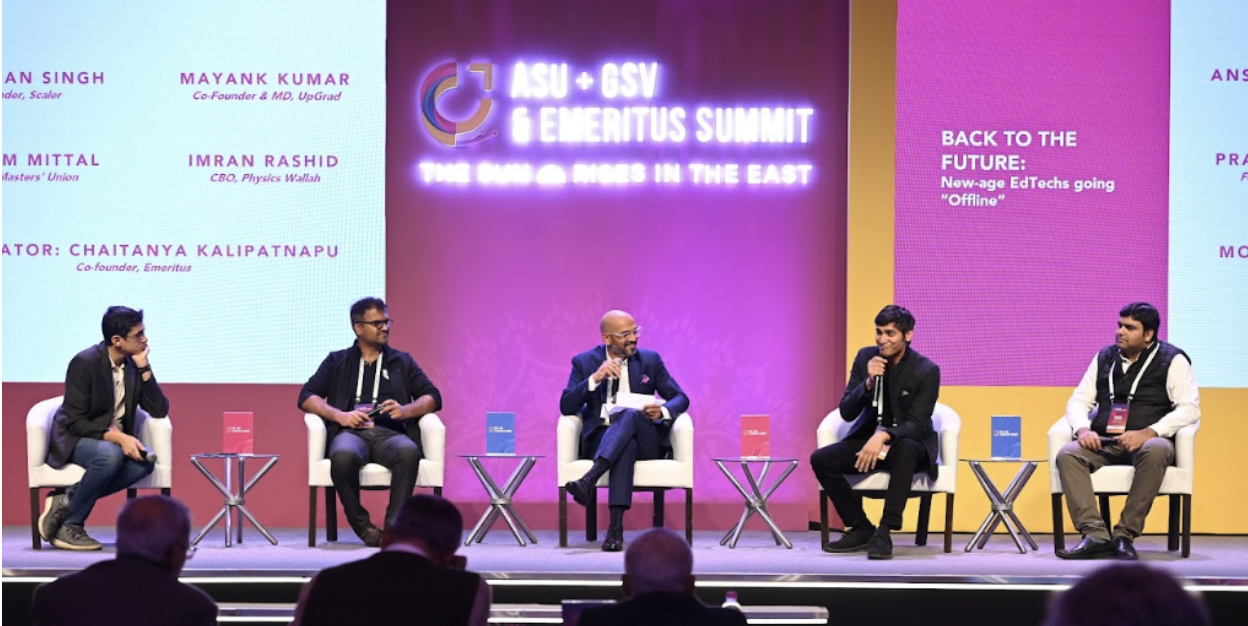 The resurgence of ‘offline’ education in edtech was a focal point of discussion at the ASU+GSV & Emeritus Summit 2024 Day 2. A panel moderated by Chaitanya Kalipatnapu delved into the merits and demerits of both online and offline models of education. Anshuman Singh, Co-Founder of Scaler, highlighted the higher engagement and attribution of success to organizations in offline setups, while Mayank Kumar, the Co-Founder of Upgrad, emphasized the offline model’s edge in encouraging discipline and reduced mis-selling.
The resurgence of ‘offline’ education in edtech was a focal point of discussion at the ASU+GSV & Emeritus Summit 2024 Day 2. A panel moderated by Chaitanya Kalipatnapu delved into the merits and demerits of both online and offline models of education. Anshuman Singh, Co-Founder of Scaler, highlighted the higher engagement and attribution of success to organizations in offline setups, while Mayank Kumar, the Co-Founder of Upgrad, emphasized the offline model’s edge in encouraging discipline and reduced mis-selling.
Singh also pointed out the potential for technology, especially AI, to scale education effectively, although he acknowledged that online education currently trails offline in maturity. Pratham Mittal, the Founder of Masters’ Union, questioned the impact of the regulatory landscape, expressing concerns about offering top-tier education within fee-capped frameworks. Imran Rashid from PhysicsWallah advocated a blended approach to learning, prioritizing a student-focused perspective that remains adaptable to regulations.
To IPO or Not to IPO, What Should Edtech Brands Do?
Deciding whether to take an edtech brand public involves strategic considerations, as was discussed during the ASU+GSV & Emeritus Summit Day 2 session. Mayank Kumar, Upgrad’s Managing Director, spoke of the importance of corporate governance and readiness, while Pranjal Kumar, Emeritus’ CFO, emphasized the need to be listed among large caps to steer the company’s destiny. Despite the sector’s recent validation and regulatory easing, the path to IPO for edtech companies has been relatively uncharted. However, Pranjal sees the current moment as opportune, likening the potential of edtech to building an “Amazon for education”.
Challenges such as scaling education and managing costs persist, highlighting the importance of focusing on outcomes amidst macro shifts. Mayank also noted the interplay between B2B and B2C segments, suggesting that understanding enterprise needs can inform consumer-focused strategies in navigating the edtech landscape. Ultimately, the decision to go public should align with a long-term vision for value creation and market dynamics, ensuring sustainable growth in the multi-generational horizon.
India and the US: Aligning Thoughts and Actions With Ambassador Eric Garcetti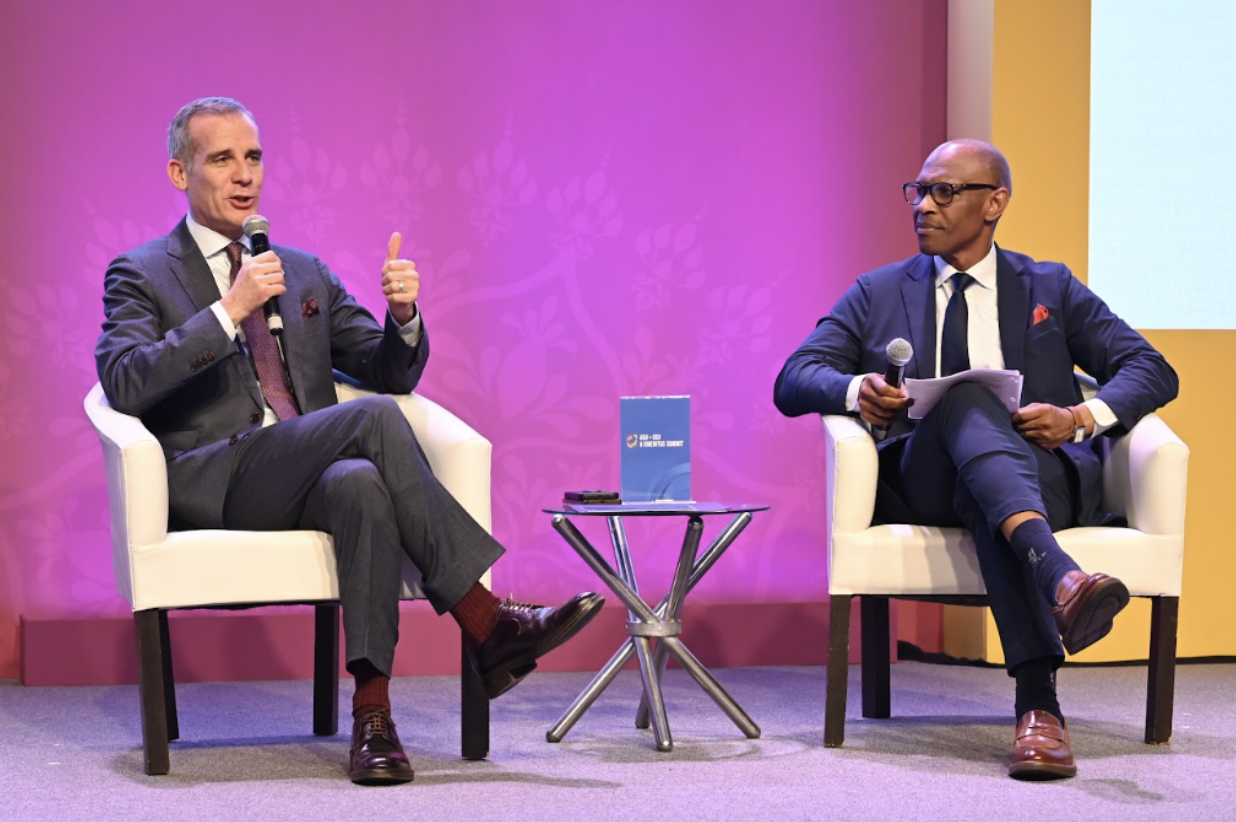
The ASU+GSV & Emeritus Summit 2024 Day 2 ended on a rather high note with a much-awaited fireside chat between United States Ambassador to India Eric Garcetti and Dr. Chris Howard, Executive Vice President and CEO of ASU University. The Ambassador defined India’s relationship with the US in a rather quoteworthy way and was met with peals of laughter. “Our (India and America) relationship status was ‘it’s complicated’ for a long time. But now we are certainly dating.”
He also touched upon several parallels between where India finds itself today, at the cusp of growth, and the US in the 1980s when growth in Silicon Valley was imminent. The G20 Summit, where India and the US together achieved the massive task of aligning countries that had no historical diplomatic ties, also found a special mention in this fireside chat.
“Indians and Americans think alike, but can we also move alike? We don’t have to cross oceans to come together. What can we do to align on skills, degrees, or job training? Let’s find a model that works and collaborate more on challenges like gender equity, climate change, and keeping girls in school so that the architecture of education in India can be changed,” he summed up. A classic end to a power-packed day.
Stay tuned for more updates tomorrow!

